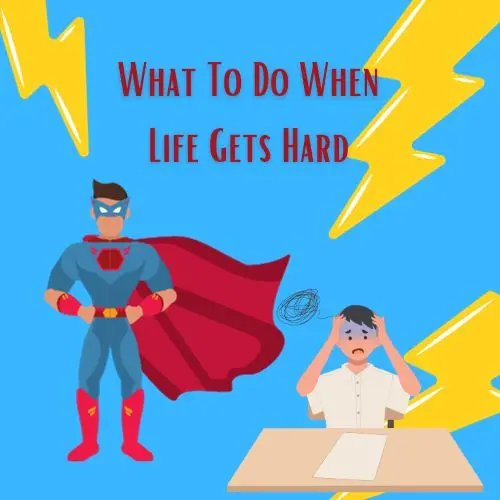Introduction
Life has a way of throwing us curveballs when we least expect it. Loss of a loved one, job issues, health crises, relationship conflicts, trauma, natural disasters – hardship can hit in many forms. It’s easy to despair and feel overwhelmed when challenges stack up, one after another.
Yet it’s possible to move through tough times in ways that build resilience, strength, and even meaning. With intention and effort, you can tap into reserves of hope, courage, and support to weather life’s storms.
Below are practical tips on caring for yourself and finding light when life gets hard:
Responding With Self-Compassion

Difficult seasons often drain our energy and emotional reserves. It’s vital to treat yourself with kindness, care and understanding. Self-compassion is key. Consider:
- Acknowledge your pain is real. Don’t minimize your struggles or judge yourself for feeling knocked down. Validate this is difficult.
- Get in touch with emotions. Don’t suppress hurt, grief, anger, fear, or other feelings. Processing them in healthy ways helps you move forward.
- Extend the grace you’d give a friend. Talk to yourself like you would a loved one facing the same hardship. Offer comfort.
- Identify lessons and growth. See if there are ways this challenge is shaping you into a wiser, more empathetic person. Find meaning.
- Forgive yourself. Don’t dwell on regrets or blame yourself. You’re doing the best you can in hard circumstances.
- Do nurturing activities. Take a hot bath, sip tea, wrap up in a cozy blanket. Soak up small sources of comfort.
With self-compassion, you create space to grieve and acknowledge pain while still seeing your inherent worth.
Taking Care of Basic Needs

When we’re struggling, it’s easy to neglect basic self-care like nutrition, sleep, and hygiene. Make these a priority:
- Eat nutritious meals. Stick to a breakfast, lunch, dinner, and healthy snacks routine, even if you don’t feel hungry. Avoid emotional eating.
- Get good sleep. Being well-rested helps you cope better emotionally. Follow a calming bedtime routine and limit screen time before bed.
- Shower regularly. Getting clean can lift your mood. Add uplifting scents like eucalyptus or lavender.
- Take medicines as prescribed. Stay on top of the dosage for any maintenance medications or supplements.
- Get outdoors. Sunshine, fresh air, and nature are healing. Stretch your legs with short, daily walks.
- Stay hydrated. Drink plenty of water and lay off the caffeine, alcohol, sugary, and high-sodium drinks, which can worsen anxiety and fatigue.
Making a self-care routine aids healing. Don’t neglect your basic needs – protect them fiercely.
Finding Healthy Distraction and Inspiration

To prevent tumbling down a rabbit hole of despair, balance processing emotions with pleasant diversions. Try:
- Engage your senses. Listen to uplifting music, light candles, word puzzles, and sip comforting drinks. Soak in beauty.
- Get moving. Walk, stretch, dance, or do another gentle exercise to release anxiety and boost mood.
- Laugh. Watch funny shows or read humor. Laughter’s good medicine!
- Lose yourself in a book. Reading pulls you into another world. Choose uplifting rather than dark topics.
- Express yourself creatively. Garden, knit, draw, sculpt, and write in a journal. Creativity uplifts.
- Listen to inspirational speakers. Find hope in the stories of those who’ve overcome incredible odds.
- Watch children play. Their innocence, joy, and wonder can renew your spirit.
- Help someone else. Get out of your head by writing a card to a friend going through a hard time or donating goods to people in need.
Pleasant activities provide pockets of relief while also moving you toward healthier functioning long-term.
Leaning Into Your Support System

You don’t need to walk through hardship alone. Your family, friends, faith community, and mentors can make the road easier.
- Open up to safe people. Sharing your struggle with trusted confidants helps you feel seen and supported. Release the burden.
- Accept help. When people offer to bring meals, help with chores, drive you to appointments or watch the kids, say yes.
- Join a support group. You’ll find comfort in sharing with those facing similar challenges, in-person or online.
- Talk to a counselor. An objective expert can give you the tools to process your situation in healthy ways.
- Pray and meditate. For those with a spiritual side, spending quiet time with God or your higher power brings strength.
- Forgive those who hurt you. Harboring bitterness and resentment only breeds more pain. Free yourself through forgiveness.
- Express gratitude. Tell supportive people how much they mean to you. Appreciate every act of kindness.
You have reservoirs of support all around. Draw deeply from them. You do not need to do this alone.
Taking One Day at a Time

When challenges feel crushing and lifelong, we can forget to breathe. Focus on getting through just one day:
- Start small. Break big problems into bite-sized steps. Just tackle what’s right in front of you today.
- Follow routines. Maintaining a predictable structure helps each day feel more manageable.
- Limit news intake. Don’t get swept away in the tsunami of a 24-hour news cycle. Stay informed, but don’t become obsessed.
- Have a calming bedtime routine. No matter what happens during the day, you can rest your mind and renew.
- Write in a gratitude journal. Before bed, list 3-5 good things that happened that day, no matter how tiny. Train your brain to see the positive.
- Forgive mistakes. Don’t beat yourself up. Wipe the slate clean at the end of each day.
- Look for beauty. Even in pain, there are snippets of life’s loveliness – sunshine through trees, a baby’s laughter, a friend’s hug. Let these lift you.
- Help someone. Get outside your head by sending a positive text or leaving flowers anonymously at a nursing home.
Focusing on making it through just one day gives you the strength to look to the future with renewed hope.
Moving Ahead with Realistic Optimism

Once the initial shock and intensity of hardship passes, you’ll start to regain some sense of direction and hope. Shift focus to moving forward realistically but also positively.
- Clarify priorities. What matters most to you in life? Let these key priorities ground you.
- Set small goals. Identify manageable steps like organizing one drawer or researching a new hobby. Small wins build momentum.
- Envision a new version of normal. How can you rebuild a satisfying life, even if it looks different from before?
- Find meaning. Consider how your suffering might help you better empathize with others’ pain. Look for purpose.
- Identify lessons. Ask yourself, “what is this hardship teaching me about life and myself?” Extract wisdom.
- Release the past. Don’t dwell on regrets, resentments, or what-ifs. Cherish good memories but live in the present.
- Cultivate gratitude. Start and end each day naming blessings that bring you joy or a smile—even small gifts matter.
Moving forward with hope versus despair allows you to create something beautiful from the ashes of hardship.
Key Factoids to Remember
- Researchers find an optimistic outlook predicts mental and physical well-being more than any other attribute. Focus on realistic optimism.
- Exercise releases feel-good endorphins and reduces stress hormones like cortisol. Even light activity sustains emotional resilience.
- Laughing lowers blood pressure, relieves pain, calms stress response, and boosts mood thanks to the release of endorphins.
- Studies show journaling improves mood, strengthens immune cells, and reduces anxiety, depression, and PTSD symptoms.
- Forgiveness lowers the risk of anxiety, depression, and chronic conditions like heart disease. Let go of bitterness.
- Social support aids healing. Isolation raises the risk of anxiety, substance abuse, suicide, and more. Accept help.
Hard times are inevitable. But your reaction matters hugely. With intention, you can tap into incredible reserves of hope, strength, and beauty inside yourself and the surrounding community. Sustain perspective; the darkness will pass. And you will pass through this valley even stronger.


1 thought on “What To Do When Life Gets Hard: Finding Hope and Healing in Challenging Times”